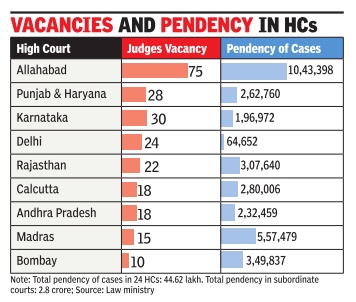High Courts: India
This is a collection of articles archived for the excellence of their content. |
Contents |
Trends
High courts ask trial courts to explain their orders: SC objects
Dhananjay Mahapatra, February 25, 2023: The Times of India
New Delhi: In a big step to restore confidence of trial court judges, the Supreme Court strongly deprecated the domineering practice of high court judges seeking explanations from district judicial officers for passing certain orders and said such actions affect the independence of district judiciary.
This order came from a bench of Chief Justice D Y Chandrachud, and Justices P S Narasimha and J B Pardiwala while hearing an appeal by one Totaram challenging a Madhya Pradesh high court single-judge bench’s order cancelling his bail. The bench noticed that the HC judge has also sought explanation from the concerned judicial officer as to why bail
was granted to the accused.
The bench set aside the HC decision and ordered release of the accused on bail, as was earlier directed by the trial court, and stayed the HC order seeking explanation from the trial judge.
Deprecating the practice of seeking explanation from subordinate judicial officers, the CJI-led bench said, “Such orders of the HC seriously affect the independence of the district judiciary in considering applications for bail in appropriate cases. ”
The trial court had last year granted bail to Totaram in a criminal case, just 10 days after the chargesheet was filed on noticing that other accused in the case have been granted bail and that the offences alleged against the accused were not punishable with either life or death sentences.
The HChad on December 2 issued a notice to the trial court seeking an explanation in regard to the order granting bail. The CJI-led bench said, “We are, prima facie, of the view that this is an eminently fit and proper case for the grant of bail even at this stage. Moreover, there was, prima facie, no justification for the HC to call for an explanation from the trial judge for having granted bail. ” It posted further hearing on the matter on April 6.
Vacancies in HCs, pendency of cases
2015
The Times of India Jan 07 2016
Dhananjay Mahapatra
Despite best efforts to speed up disposal of cases, pendency in the high courts may spiral to a monstrous 1 crore cases by the year-end from the present 45 lakh as 24 HCs are functioning with 43% vacancies with only 599 judges as against a sanctioned strength of 1,044.
The Supreme Court, too, has five vacancies and a pendency of around 60,000 cases.With trial courts having around 2.75 crore pending cases, the total backlog of the judiciary mounts to 3.25 crore cases. Judges fear that it might touch 4 crore cases by the year-end.
The disposal of cases suffered as the process for appointment of judges came to a standstill for almost a year because of the Constitution al tug-of-war between the legislature and judiciary over the National Judicial Appointments Commission, which was scrapped by the SC, in turn reviving the collegium system. But the collegium system is expected to resume functioning only by the beginning of February after the Centre finalises the memorandum of procedure in consultation with Chief Justice T S Thakur.
But, filling 445 vacancies would take more than a year. By that time more judges would retire throwing the ju diciary into a complex web o pendency caused by the huge number of vacancies.
But this is just the begin ning of the problem. The Centre is finalising the mem orandum of procedure (MoP) for selecting HC and SC judges and it could change many rules that has been en trenched into the system since 1998, when the judici ary had decided to make itsel the sole selector of judges. The Centre feels that mer it should get as much consideration as seniority , which has been the usual norm while selecting judges for the SC. Mainly chief justices of the high courts are selected as SC judges. It also wants to insert a clause that a HC judge with outstanding merit and ability to do justice should be appointed as a SC judge ahead of the CJs of HCs.
In appointment of HC judges, the Centre wants to broad-base the process. Till now, the names have been suggested by the collegium headed by the HC CJ. But, the Centre wants all other judges should be permitted to suggest names of advocates and district judges whom they consider `outstanding'. The MoP also provides that the process for filling vacancies must commence six months prior to the retirement of a judge.
Over 40% of positions of Justices of high courts remaining vacant is simply not acceptable. One of the most fundamental duties of a state to its citizens is the delivery of justice. A situation in which justice is often too delayed to be meaningful cannot be allowed to continue. TOI has consistently campaigned for vacancies to be filled and pending cases to be urgently tackled. The stand-off between the judiciary and the executive on how judges are to be appointed has clearly not helped, but the vacancies must be filled, the sooner the better.
